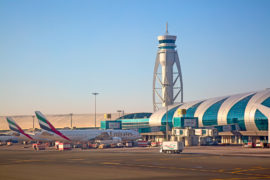The international travel and tourism industry continues to be adversely affected by coronavirus, and a dip in the performance of hotels in the United Arab Emirates has now begun.
The average daily rate and available revenue per room is falling because of lower occupancy levels.
The occupancy rate of hotels in the UAE fell to 67% on 8th February, a 22% decline over the same period in 2019, according to data for the first week of the month from STR.
This also caused falls in both ADR (Dh519.53) and RevPAR (Dh349) of 18% and 36% respectively on the exact same date.
Declines in year-on-year occupancy rates were already anticipated for February because of the shift in the Chinese New Year calendar, with Dubai being a major destination for Chinese tourists, according to STR’s area director for the Middle East and Africa Philip Wooller.
In an email interview, Wooller admitted, however, that looking at the early data for the month indicates an increased drop in demand beyond what was expected because of the outbreak of coronavirus.
Occupancy fell to 66% on the first Saturday of the month and then to 67% by the following Saturday, with both numbers being considered low by normal market standards.
China is one of the UAE’s most important source markets, with 989,000 Chinese tourists being welcomed by Dubai last year, an increase of 15% on the year before.
As an international business and tourist hub, the emirate also saw a total of 16.73 million guests from overseas in 2019, increasing from the 2018 figure of 15.92 million.
Visitors from China currently account for between 5% and 6% of total visits to the emirate, but this segment has been increasing at a CAGR of 14% for the last couple of years, according to PwC regional partner and global deals real estate leader Martin Berlin.
The current circumstances in China could have an impact on those visitor levels, though Berlin cautions that it is too early for that risk to be quantified as yet.
The hospitality industry in Dubai is at the most risk in the region because of the travel restrictions that have resulted from the outbreak of coronavirus, according to a February report from Reuters that quoted analysts from S&P.
The report states that a prolonged period of travel restrictions could even cause a fall in the number of visitors attending Expo 2020, which is set to begin in October and run for six months until April 2021.
However, many analysts say that it is still too difficult to make predictions as to what the short-term or mid-term impact of the outbreak will be because the situation continues to change with each passing day.
Tourism Economics senior economist Matthew Dass adds that it is far too early to suggest that Expo 2020 will be adversely affected by the crisis.
Anyone who is intending to travel to and from the UAE should take out travel insurance to guard against the financial impact of falling ill while away from home.




